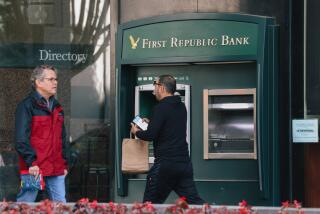Obama urges community bankers to step up lending
- Share via
Reporting from Washington — President Obama met with community bankers at the White House on Tuesday and absolved them of blame for the financial crisis. But they didn’t get off scot-free, as the president suggested they weren’t lending enough.
A little more than a week after calling executives of large financial institutions “fat-cat bankers” who helped trigger the country’s economic troubles, the president was much kinder to a dozen small banks. But he delivered the same message -- albeit in a nicer tone -- as he did to a gathering of the big-bank chieftains: Make more loans to small businesses to help create jobs.
“I think it’s fair to say that most of these community banks were not engaged in some of the hugely risky activities that helped to precipitate the financial crisis,” Obama told reporters at the end of the meeting with bankers from states such as Illinois, New Mexico, New York and Wisconsin.
Although he praised community banks for doing their part to help their cities and towns recover from the recession, the president said they needed to go further to get small businesses the money they need to start hiring again.
“There are businesses that are looking for loans out there, that are profitable and ready to make money, and the key is to match them up with banks that are in a position to lend,” Obama said.
The community bankers said they wanted to lend more but were constrained by federal regulators, who since the crisis began have been pressing banks to maintain higher levels of capital to cover potential losses.
James D. MacPhee, chief executive of Kalamazoo County State Bank in Michigan, said Obama and his top economic aides were receptive to the bankers’ concerns.
“The president’s message today was that they’re listening,” MacPhee said. “They know that the community banks of this nation did not create this train wreck.”
The country’s small banks, which number about 8,000, might not have caused the problem, but they’re a key to helping the economy recover. Despite accounting for only 12% of all bank assets, community banks make nearly one-third of all loans of less than $1 million to small businesses, the Independent Community Bankers of America said.
“The bread and butter of community banks is small-business lending,” said Paul Merski, chief economist for the trade group, which represents about 5,000 banks.
Like big banks, however, small banks have cut back on lending as they have struggled with fallout from the financial crisis and recession.
Business loans on the balance sheets of all federally insured U.S. banks fell $89.1 billion, or 6.5%, from July 1 to Sept. 30, according to the Federal Deposit Insurance Corp. That was part of a $210-billion drop in overall loans outstanding, the largest such decline since at least 1984.
“In some ways, the pendulum may have swung too far in the direction of not lending, after a decade in which it had gone way too far in the direction of getting money out the door, no matter the risk,” Obama said. “If we can get that balance right . . . there are businesses and communities out there that are ready to grow again.”
The bankers at the meeting said one reason they weren’t lending more was increased regulator constraints. Federal regulators have been pressing all banks to hold on to more capital to cover potential losses.
Obama, though noting that regulators are independent and don’t report directly to the White House, said his administration was looking at ways to “cut some of the red tape.”
Edward L. Yingling, president of the American Bankers Assn., which represents small and large banks, echoed concerns about toughened regulatory standards.
“In many cases, bank examiners are exercising more caution when reviewing bank lending portfolios. This is understandable given the recent financial crisis,” Yingling said. “Yet the bank regulators need to be prudent without being so punitive that they choke off lending in communities across the country,”
William Ruberry, a spokesman for the Office of Thrift Supervision, said regulators were trying to avoid a repeat of the risky loan practices that led to the financial crisis. “We want loans to be made, but we want them to be good loans,” he said.
More banks are being told to increase their capital reserves, he said, because more have troubled portfolios because of the recession.
But when you factor in the tougher regulation and the difficulty of making sound loans in a rough economy, community banks are finding it very difficult to lend, said Merski of the bankers trade group.
Community bankers have been pushing regulators to ease up. Merski said there was an encouraging sign in October when four regulatory agencies gave banks greater flexibility in writing down the value of bad commercial real estate loans on their books.
jim.puzzanghera @latimes.com
More to Read
Inside the business of entertainment
The Wide Shot brings you news, analysis and insights on everything from streaming wars to production — and what it all means for the future.
You may occasionally receive promotional content from the Los Angeles Times.








